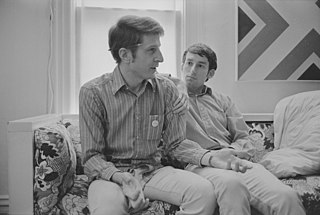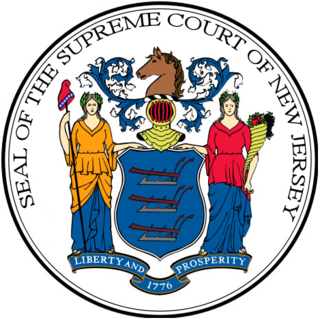Baker v. Vermont, 744 A.2d 864, was a lawsuit decided by Vermont Supreme Court on December 20, 1999. It was one of the first judicial affirmations of the right of same-sex couples to treatment equivalent to that afforded different-sex couples. The decision held that the state's prohibition on same-sex marriage denied rights granted by the Vermont Constitution. The court ordered the Vermont legislature to either allow same-sex marriages or implement an alternative legal mechanism according similar rights to same-sex couples.

A civil union is a legally recognized arrangement similar to marriage, created primarily as a means to provide recognition in law for same-sex couples. Civil unions grant some or all of the rights of marriage.
A domestic partnership is a relationship, usually between couples, who live together and share a common domestic life, but are not married. People in domestic partnerships receive legal benefits that guarantee right of survivorship, hospital visitation, and other rights.

The availability of legally recognized same-sex marriage in the United States expanded from one state (Massachusetts) in 2004 to all fifty states in 2015 through various court rulings, state legislation, and direct popular votes. States each have separate marriage laws, which must adhere to rulings by the Supreme Court of the United States that recognize marriage as a fundamental right guaranteed by both the Due Process Clause and the Equal Protection Clause of the Fourteenth Amendment to the United States Constitution, as first established in the 1967 landmark civil rights case of Loving v. Virginia.

Goodridge v. Dept. of Public Health, 798 N.E.2d 941, is a landmark Massachusetts Supreme Judicial Court case in which the Court held that the Massachusetts Constitution requires the state to legally recognize same-sex marriage. The November 18, 2003, decision was the first by a U.S. state's highest court to find that same-sex couples had the right to marry. Despite numerous attempts to delay the ruling, and to reverse it, the first marriage licenses were issued to same-sex couples on May 17, 2004, and the ruling has been in full effect since that date.
Same-sex marriage has been legal in Ireland since 16 November 2015. A referendum on 22 May 2015 amended the Constitution of Ireland to provide that marriage is recognised irrespective of the sex of the partners. The measure was signed into law by the President of Ireland, Michael D. Higgins, as the Thirty-fourth Amendment of the Constitution of Ireland on 29 August 2015. The Marriage Act 2015, passed by the Oireachtas on 22 October 2015 and signed into law by the Presidential Commission on 29 October 2015, gave legislative effect to the amendment. Same-sex marriages in the Republic of Ireland began being recognised from 16 November 2015, and the first marriage ceremonies of same-sex couples in Ireland occurred the following day.

The Supreme Court of New Jersey is the highest court in the U.S. state of New Jersey. In its current form, the Supreme Court of New Jersey is the final judicial authority on all cases in the state court system, including cases challenging the validity of state laws under the state constitution. It has the sole authority to prescribe and amend court rules and regulate the practice of law, and it is the arbiter and overseer of the decennial legislative redistricting. One of its former members, William J. Brennan Jr., became an associate justice of the Supreme Court of the United States.
Same-sex marriage has been legally recognized in New York since July 24, 2011 under the Marriage Equality Act. The Act does not have a residency restriction, as some similar laws in other U.S. states do. It allows religious organizations to decline to officiate at same-sex wedding ceremonies.
Same-sex marriage has been legally recognized in New Jersey since October 21, 2013, the effective date of a trial court ruling invalidating the state's restriction of marriage to persons of different sexes. In September 2013, Mary C. Jacobson, Assignment Judge of the Mercer Vicinage of the Superior Court, ruled that as a result of the U.S. Supreme Court's June 2013 decision in United States v. Windsor, the Constitution of New Jersey requires the state to recognize same-sex marriages. The Windsor decision held that the federal government was required to provide the same benefits to same-sex couples who were married under state law as to other married couples. Therefore, the state court reasoned in Garden State Equality v. Dow that, because same-sex couples in New Jersey were limited to civil unions, which are not recognized as marriages under federal law, the state must permit civil marriage for same-sex couples. This ruling, in turn, relied on the 2006 decision of the New Jersey Supreme Court in Lewis v. Harris that the state was constitutionally required to afford the rights and benefits of marriage to same-sex couples. The Supreme Court had ordered the New Jersey Legislature to correct the constitutional violation, by permitting either same-sex marriage or civil unions with all the rights and benefits of marriage, within 180 days. In response, the Legislature passed a bill to legalize civil unions on December 21, 2006, which became effective on February 19, 2007.
James Ronald Zazzali is an American jurist who served as Chief Justice of the New Jersey Supreme Court from October 26, 2006, until his retirement on June 17, 2007. He previously served as an associate justice of the Supreme Court from June 14, 2000.
Same-sex marriage has been legally recognized in Connecticut since November 12, 2008, following a state court decision that found the state's civil unions failed to provide same-sex couples with rights and privileges equivalent to those of marriage. Connecticut was the second U.S. state to legalize same-sex marriage, after neighboring Massachusetts.
In response to court action in a number of states, the United States federal government and a number of state legislatures passed or attempted to pass legislation either prohibiting or allowing same-sex marriage or other types of same-sex unions.

Same-sex marriage has been legal in Hawaii since December 2, 2013. The Hawaii State Legislature held a special session beginning on October 28, 2013, and passed the Hawaii Marriage Equality Act legalizing same-sex marriage. Governor Neil Abercrombie signed the legislation on November 13, and same-sex couples began marrying on December 2. Hawaii also allows both same-sex and opposite-sex couples to formalize their relationships legally in the form of civil unions and reciprocal beneficiary relationships. Civil unions provide the same rights, benefits, and obligations of marriage at the state level, while reciprocal beneficiary relationships provide a more limited set of rights.

Varnum v. Brien, 763 N.W.2d 862, was an Iowa Supreme Court case in which the Court unanimously held that the state's limitation of marriage to opposite-sex couples violated the equal protection clause of the Iowa Constitution. The case had the effect of legally recognizing same-sex marriage in Iowa. In 2007, a lower court had granted summary judgment in favor of six same-sex couples who sued Timothy Brien, Polk County Recorder, for refusing to grant them marriage licenses.
Deborah Tobias Poritz is an American jurist. She was the Chief Justice of the New Jersey Supreme Court from 1996 to 2006, and was the Attorney General of New Jersey from 1994 to 1996, in both cases becoming the first woman to serve in that position.
Kerrigan v. Commissioner of Public Health, 289 Conn. 135, 957 A.2d 407, is a 2008 decision by the Connecticut Supreme Court holding that allowing same-sex couples to form same-sex unions but not marriages violates the Connecticut Constitution. It was the third time that a ruling by the highest court of a U.S. state legalized same-sex marriage, following Massachusetts in Goodridge v. Department of Public Health (2003) and California in In re Marriage Cases (2008). The decision legalized same-sex marriage in Connecticut when it came into effect on November 12, 2008. There were no attempts made to amend the state constitution to overrule the decision, and gender-neutral marriage statutes were passed into law in 2009.

Lesbian, gay, bisexual, and transgender (LGBT) persons in New Jersey have the same rights as non-LGBT people. LGBT persons in New Jersey enjoy strong protections from discrimination, and have had the right to marry since October 21, 2013.
United States v. Windsor, 570 U.S. 744 (2013), is a landmark United States Supreme Court civil rights case concerning same-sex marriage. The Court held that Section 3 of the Defense of Marriage Act (DOMA), which denied federal recognition of same-sex marriages, was a violation of the Due Process Clause of the Fifth Amendment.
This article contains a timeline of significant events regarding same-sex marriage in the United States. On June 26, 2015, the landmark US Supreme Court decision in Obergefell v. Hodges effectively ended restrictions on same-sex marriage in the United States.
Garden State Equality v. Dow, 82 A. 3d 336 is a New Jersey Superior Court case holding that New Jersey's marriage laws violated the rights of same-sex couples to equal protection of the law under the New Jersey State Constitution. The ruling was issued on September 27, 2013. The Superior Court and the Superior Court, Appellate Division refused the State's request for a stay of the trial court's order, and the New Jersey Supreme Court refused to do so on a 7–0 vote. The ruling took effect on October 21, 2013. On the same day, New Jersey Governor Chris Christie dropped the State's plans to appeal, ending the denial of marriage rights to same-sex couples in New Jersey.







